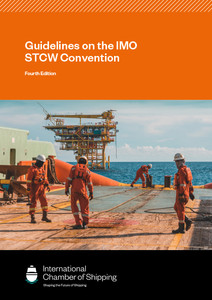
The International Convention on Standards of Training, Certification and Watchkeeping for Seafarers, 1978 (STCW Convention), aims to promote safety of life and property at sea and protection of the marine environment by establishing international standards of training, certification and watchkeeping for seafarers.
This publication contains the Final Act of the 2010 Conference of Parties to the 1978 STCW Convention, resolutions adopted by that Conference, and a complete, consolidated text of the STCW Convention, including its original articles, revised annex and supporting STCW Code. This edition incorporates the 2014 amendments (MSC.373(93) and MSC.374(93)), the 2015 amendments (MSC.396(95) and MSC.397(95)) and the 2016 Amendments (MSC.416(97) and MSC.417(97)).
Foreword
A comprehensive review of the 1978 STCW Convention commenced in January 2006 and culminated in a Conference of Parties to the STCW Convention, held in Manila, Philippines, from 21 to 25 June 2010, that adopted a significant number of amendments to the STCW Convention and STCW Code. The amendments update standards of competence required, particularly in light of emerging technologies, introduce new training and certification requirements and methodologies, improve mechanisms for enforcement of its provisions, and detail requirements on hours of work and rest, prevention of drug and alcohol abuse, and medical fitness standards for seafarers.
This publication contains the Final Act of the 2010 Conference of Parties to the 1978 STCW Convention, resolutions adopted by that Conference, and a complete, consolidated text of the STCW Convention, including its original articles, revised Annex and supporting STCW Code.
The Convention articles and annex provide the legal framework within which mandatory technical standards contained in part A of the STCW Code are applied. Part B of the Code provides guidance to assist those involved in educating, training or assessing the competence of seafarers or who are otherwise involved in applying STCW Convention provisions. While not mandatory, the guidance given has been harmonized through discussions within IMO, involving, where appropriate, consultation with the International Labour Organization. Observance of this guidance will contribute to achieving a more uniform application of Convention requirements.
All parts of this publication must be studied to understand the intent of the Convention fully and to give complete effect to the minimum global standards of knowledge, understanding, experience and professional competence desired by the States that are Parties to it, the industry itself and the general public.
The Convention and part A of the Code form a binding treaty between States, the interpretation of which is governed by the Vienna Convention on the Law of Treaties. The revision aims to bring the Convention and Code up to date with developments since the last full revision and to enable them to address issues that are anticipated to emerge in the foreseeable future in an effort to raise the standards of competence and professionalism of seafarers, upon whom the safety of life, property and the environment depends.
Foreword
STCW Convention
International Convention on Standards of Training, Certification and Watchkeeping for Seafarers, 1978, as amended
STCW Code
Seafarers’ Training, Certification and Watchkeeping Code, as amended
As a specialised agency of the United Nations, the International Maritime Organization (IMO) is the global standard-setting authority for the safety, security and environmental performance of international shipping. Its main role is to create a regulatory framework for the shipping industry that is fair and effective, universally adopted and universally implemented.
In other words, its role is to create a level playing-field so that ship operators cannot address their financial issues by simply cutting corners and compromising on safety, security and environmental performance. This approach also encourages innovation and efficiency.
Shipping is a truly international industry, and it can only operate effectively if the regulations and standards are themselves agreed, adopted and implemented on an international basis. And IMO is the forum at which this process takes place.
- Number of Pages:
- 378
- Published Date:
- December 2017
- Book Height:
- 250 mm
- Book Width:
- 210 mm
- Author:
IMO
- ISBN:
- 9789280116359
- Binding Format:
- Hardback
- Preview:
- Yes
- Publication Date:
- June 2020






